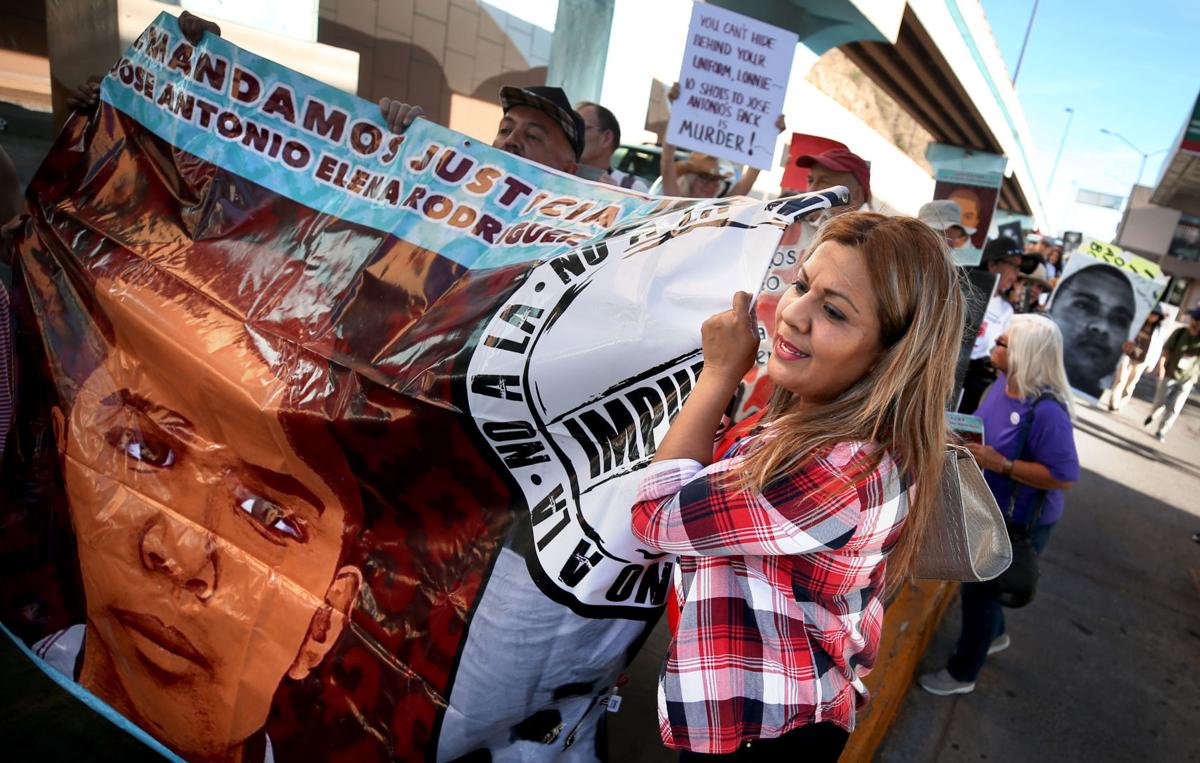PHOENIX — A new U.S. Supreme Court ruling likely slams the door on the ability of the family of a teen killed by a Border Patrol agent in Nogales to sue him and, by extension, the federal government.
In a 5-4 decision Tuesday, the justices threw out claims filed by the family of 15-year-old Sergio Adrián Hernández against Jesus Mesa Jr., a Border Patrol agent who, while standing on the United States side of the border in El Paso, shot and killed Hernández on the other side of a culvert in Mexico.
Justice Samuel Alito, writing for the majority, said courts in this country cannot adjudicate what effectively is an international dispute.
But Justice Ruth Bader Ginsburg, in her dissent, said there is no reason U.S. courts cannot rule on the conduct of U.S. Border Patrol agents who deploy their weapons while standing on the U.S. side of the border. She said where the shots land is irrelevant.
Ginsburg said the effect of Tuesday’s ruling will be to leave those who are killed by Border Patrol agents in cross-border shootings without a legal remedy, effectively giving agents immunity.
Tuesday’s ruling is virtually certain to quash a nearly identical lawsuit filed by Araceli Rodriguez following the 2012 shooting death of her son, Jose Antonio Elena Rodriguez. As in the Texas case, the teen, 16 at the time, was in Mexico when Border Patrol agent Lonnie Swartz shot him by firing through the fence at Nogales.
Evidence presented in that case shows the teen was hit 10 times in the back. Swartz also reloaded, firing a total of 16 shots.
The majority of the 9th U.s. Circuit Court of Appeals upheld Rodriguez’s right to sue, saying that U.S. courts “have a compelling interest in regulating own government agents’ conduct on our own soil.”
But Lee Gelernt, an attorney with the American Civil Liberties Union who is representing Rodriguez, told Capitol Media Services that Tuesday’s Supreme Court decision likely means that his client no longer has a valid claim.
“It appears to leave not very much daylight between our case and Hernandez,” he said.
Gelernt said Tuesday’s ruling will send the Rodriguez case back to the 9th Circuit. He said that, in the interim, he and the other attorneys working the case will look for any differences that might keep this case alive.
“But I think it’s going to be a difficult battle,” Gelernt said.
Luis Parra, the family’s Nogales attorney, said the teen’s family members are “distraught, to say the least.”
“They obviously were in tears this morning over the decision,” he said.
Parra also said there may be one factor that ultimately could result in a different outcome for this case than what the Supreme Court decided in the Texas ruling.
He said Rodriguez had “substantial ties” to the United States through his grandparents, Taide and Jose Elena who are U.S. citizens, as are other family members. Parra said that may be enough to convince a court that, unlike Hernández, he — and his survivors — are entitled to certain legal rights.
Although the federal government argued against civil liability for Swartz, it charged him with second-degree murder. A jury acquitted him of that charge but deadlocked on manslaughter.
Federal prosecutors eventually dismissed the case.
In Tuesday’s ruling, Alito said there are many reasons to keep U.S. courts from interceding in cross-border incidents.
“The first is the potential effect on foreign relations,” he wrote. “Matters relating to the conduct of foreign relations are so exclusively entrusted to the political branches of government as to be largely immune from judicial inquiry or inference.”
This issue, the justice said, creates a conflict.
“The United States has an interest in ensuring that agents assigned the difficult and important task of policing the border are held to standards and judged by procedures that satisfy United States law and do not undermine the agents’ effectiveness and morale,” Alito said.
“Mexico has an interest in exercising sovereignty over its territory and in protecting and obtaining justice for its nationals,” he continued. “It is not our tax to arbitrate between them.”
Alito said that, in the absence of judicial intervention, the two countries would attempt to reconcile their interests through diplomacy.
“And that has occurred,” he said, citing the 2014 creation of a joint Border Violence Prevention Council.
But Ginsburg, writing for herself and three other dissenters, said the majority ruling ignores the crucial facts of the geography of this incident — the same geography that applies in the Nogales case.
She said it is true the victim was on the Mexican side of the border.
“But Hernandez’s location as the precise moment the bullet landed should not matter one whit,” Ginsburg said, saying the purpose of allowing lawsuits in this kind of situation “is to deter the officer.”
She said the allegations about the deployment of deadly forces occurred on United States soil.
“It scarcely makes sense for a remedy trained on deterring rogue officer conduct to turn upon a happenstance subsequent to the conduct — a bullet landing in one half of a culvert, not the other,” Ginsburg wrote.
If nothing else, she said, the United States “unquestionably has jurisdiction to prescribe law governing Border Patrol agent’s conduct.”
Ginsburg also brushed aside the majority’s claim that these kind of lawsuits have a potential impact on foreign relations which, in turn, would require courts to step aside.
“Plaintiffs, however, have brought a civil damages action, no different from one a federal court would entertain had the fatal shot hit Hernández before he reached the Mexican side of the border,” she said. And while Ginsburg said cross-border shootings can spark bilateral discussion, “but so too does a range of smuggling and other border-related issues that courts routinely address concurrently with whatever diplomacy may also be addressing them.”
And specifically addressing the Nogales case, Ginsburg said the government cited no negative effects on diplomatic relations after the 9th Circuit gave the go-ahead for Rodriguez to pursue her lawsuit.





